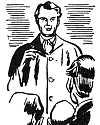|
Faraday
was so delighted with this new idea and its great possibilities
that he showed it to Gladstone, the English statesman. Gladstone looked
on with much interest and asked, "Of what use is it?" Faraday replied,
"Why, Sir, there is every possibility it may have industrial
application and you may soon be able to tax it."
If Faraday and Gladstone were living today, they could see just how true was this prophecy, because from these simple experiments has come our electrical industry with its great army of employees and, if I have been properly informed, taxes have come too, just as Faraday predicted.  In 1825, when he was only thirty-two years old, Faraday was
elected a Fellow in the Royal Society. But he never forgot the help he
had received from the lectures of Sir Humphrey Davy. And to help others
as he had been helped, he became a lecturer and teacher himself. Nor
did he forget the Christmas Day when the idea came to him. For each
year at Christmas time, he gave a series of scientific lectures to the
young people to pay, as he thought, the debt he owed the community.
In 1825, when he was only thirty-two years old, Faraday was
elected a Fellow in the Royal Society. But he never forgot the help he
had received from the lectures of Sir Humphrey Davy. And to help others
as he had been helped, he became a lecturer and teacher himself. Nor
did he forget the Christmas Day when the idea came to him. For each
year at Christmas time, he gave a series of scientific lectures to the
young people to pay, as he thought, the debt he owed the community.The great scientists of England have continued these Christmas lectures through all these years. In England, Christmas and Faraday are closely linked. |








